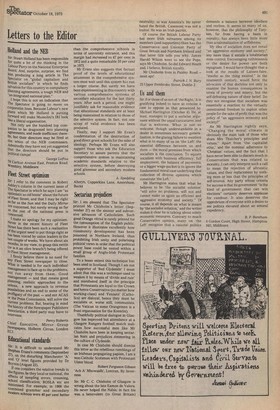Us and them
Sir: For those of us not of 'the Right,' it is gratifying indeed to have so concise a case to oppose as that presented by Michael Harrington (October 4). He, at least, manages to put a socialist argument without the usual caricatures, and that is welcome. What is not so welcome, though understandable in a dealer in sometimes necessary generalisation, is the glaring failure to mention what is to many of us on 'the Left' the essential difference between us and them — the moral premises from which socialism is the conclusion. To equate socialism with business efficiency, full employment, the balance of payments, or a bigger wage-packet is to ignore the fundamental moral case underlying that collection of diverse opinions which constitute 'the Left.'
Mr Harrington states that what he believes to be 'the socialist solution' "will solve no problems, will not and cannot make us again an efficient and aggressive economy and society." Of course, it all depends on what is meant by the socialist solution,' and the writer makes it clear he is talking about solely economic measures. Contrary to much Conservative opinion, many on 'the Left' recognise that a rational politics demands a balance between idealism and realism. It seems to many of us, however, that the philosophy of Toryism, far from having a basis in morality, has always been little more than a rationalisation of selfishness.
My idea of socialism does not entail "an aggressive economy and society," any more than it entails a totalitarian state control. Encouraging ruthlessness or the desire for power are both repugnant. I would have thought that a look at the results of Laissez-faire, "insofar as the thing existed," in the nineteenth century, would force the advocates of that doctrine not only to examine the human consequences in terms of poverty and misery, but the self-defeating nature of their belief. Do they not recognise that socialism was essentially a reaction to the virtually unrestrained freedom to exploit other people for the sake of profit that was the policy of "an aggressive economy and society?"
As Mr Harrington rightly says, "Changing the moral climate is obviously the main task of those who share Mrs Thatcher's principles and values." Apart from 'the capitalist ethic,' and the nominal adherence to 'Christian' values, and the fact that I have never been able to discern much in Conservatism that was related to morality, I can only interpret such a call to mean the rejection of altruistic values, and their replacement by nothing more or less than the principles of self-interest. Any party whose criteria for success is that its government "is the kind of government that can win elections" certainly deserves applause for candour. It also deserves the opprobrium of everyone with a desire to see politics elevated about an amoral expediency.
B. P. Bore horn
4 Gordon Court, High Street, Hampton Hill, Middlesex


































 Previous page
Previous page